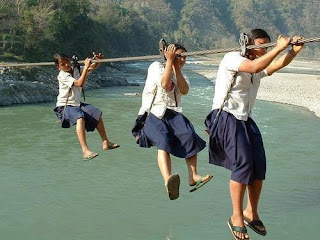Kuttanad has wooden snakes competing in boat races. They are long,
narrow ships rowed by dozens of deep dark men wanting to win the Nehru Trophy.
They create an unparalleled excitement among the local spectators and
increasingly so among foreign tourists.
For me and the Dutch a drinking water engineer, they organized one extra time of
that boat race. Yes, they did that. In 1980.
Well, was it
really for us two? We were delegated by the Dutch government who had in mind
sending millions of guilders for the construction of the three large drinking
water projects. We had to find out the soundness of the submitted plans and the
social needs of safe drinking water in this South Indian state of Kerala.
Each of us
received two miniature snake boats. One, presented by the local engineers who
smelled money, was made of black mahogany wood with rowers carved out of white
ivory. I received that boat with mixed feelings. The other boat was made of
cheap wood and had the text: ‘Presented by the People of Kuttanad’. I took to
it immediately.
On our journey
back home, it appeared that the mahogany boat fitted well in my suitecase, but
the People’s boat was too long. The only available solution was to keep it as
hand luggage.
At Kochi Airport
I had to explain how I got that long snake boat. Security officers remained
busy assessing the danger, worried as they were about the sharp yellow point it
had. We found out that point could be removed and I had to put in my main
suitcase. Thus the problem was solved and we departed.
In Mumbai I
spent a night at the house of my colleague Dr Pillai and his family. Next
evening Pillai walked me, through the homeless families that peacefully
prepared for the night on the pavement of his street, to a taxi. The taxi took
me to Chhatrapati Shivaji International Airport.
Once in the
Swissair plane above the Indian Ocean I reflected on our mission in Kerala, the
bad drinking conditions, the local poverty and the boat race they nevertheless
held for us. But, hey, where was my People’s boat? It was lost. Where did I
leave it? I could not remember.
It was three
years later that I made a stopover in Mumbai again and visited Dr Pillai in his
rather well-to-do neighborhood. We discussed life and the world at his balony,
with the homeless families peacefully murmuring on the pavement.
Back inside,
Pillai went up to a cupboard and came back with something I recognized. It was
the Kuttanad boat. It still had ‘Presented by the People of Kuttanad’ painted
on it. I was stunned.
‘Yes’, Pillai
said, ‘you left the boat by mistake at the back seat of the taxi. The driver
was from nearby here, remembered my street, asked around among the pavement
dwellers and brought the boat back to me. Some people in India are unreliable,
others have a good heart.’
From that
journey I brought the boat safe and sound back to Holland and still have it.
Snake Boat Race
2015 https://www.youtube.com/watch?v=8ASLLcLb9LY



































